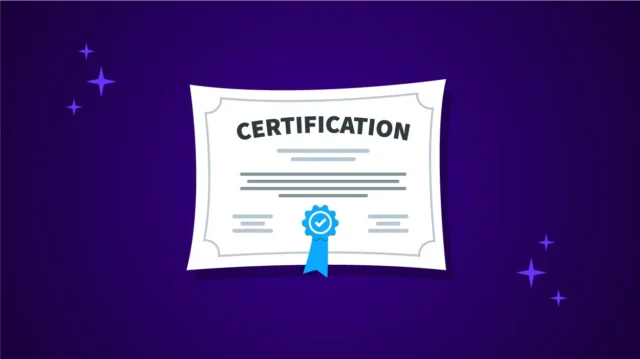
Certifications expand your skills and knowledge in specific areas. Some certifications are catered to certain industries and may even be a requirement for employment. Other certifications, however, are beneficial to a wider range of careers. We have compiled a list of certifications that can help any career.
Sales Certifications

Sales certifications can be helpful in most workplaces, whether you’re directly involved in sales or not. A formal background in sales can give you a unique perspective in marketing, retail, or other creative industries. You’ll also find a wide range of sales certifications online that can help you expand specific sales skills, including internal, external, upselling, or spin-selling techniques.
Project Management
Project managers have leadership and organizational skills that can help in any career. Whether you lead others or are responsible for managing your own projects, you’ll most likely benefit from a project management certification. Additionally, many employers value project management skills, so showing a certification on your resume can help you land a new job.
A few great project management certifications to consider include Project Management Professional (PMP) or Certified Project Manager (CPM).
CPR

Cardiopulmonary resuscitation (CPR) is an emergency lifesaving protocol that helps keep the blood flowing in the body until help arrives. While CPR certifications have a lot of value in the medical industry, they may also come in handy in other careers. Even if you work in an office, you may have an opportunity to save someone’s life one day with CPR certification.
Other industries that may benefit from CPR certification include teachers, childcare workers, nursing home staff, and retail workers. Any career in which you interact with the public or coworkers could benefit from CPR skills.
Medical field careers may also find CPR recertifications beneficial, as these online courses from ProTrainings allow you to brush up on your skills. A ProTrainings online class also makes it easy for medical professionals to renew their certifications on time without any lapses in employment eligibility.
First Aid
A first aid certification expands even more lifesaving skills that prepare you to better respond to an emergency. First aid skills can help in the classroom or any other public location. First aid skills may be helpful after a natural disaster, fire, or accident. Additionally, first aid classes teach you how to administer lifesaving practices to people of all ages and sizes.
Microsoft Certifications

Many career industries today use Microsoft programs to communicate, create presentations, or draft proposals. Learning the ins and outs of different Microsoft programs can make your resume stand out when applying for jobs. Even once you’ve landed a new job, polished Microsoft skills can help you be more efficient and organized in your new career.
A few programs to focus on when expanding your Microsoft skills include PowerPoint, Excel, SharePoint, Microsoft Teams, or Word. You’ll also find that many online schools use these programs, so expanding your skills in them can help you more efficiently earn additional credentials.
Emergency Response
Many states offer free emergency response training classes, which can help you expand your knowledge. You may even decide to become a part of a Community Emergency Response Team (CERT) through FEMA. These programs help first responders and volunteers develop the necessary training and skills to respond to natural disasters. Even if you don’t plan to volunteer or take on a first responder career, these skills can help in your daily life.
OSHA Training

Certain fields are regulated by the Occupational Safety and Health Administration (OHSA). Having a deep understanding of these regulations can help you advance your career in these fields. OSHA offers a wide variety of safety training classes, including machinery safety, cranes in construction, shipyard employment, and excavation safety. OSHA certifications can also show dedication when trying to enter a new career in construction.
Quickbooks Certification
You don’t have to work in accounting to benefit from a Quickbooks certification. Many organizations use Intuit’s Quickbooks to organize bookkeeping and invoices. Even if your employer doesn’t use Quickbooks, you’ll find that many of the skills learned in a certification course transfer. A Quickbooks certification can also help expand your accounting and auditing skills, both in-demand skills in many fields today.
Tips for Obtaining and Maintaining Certifications

Obtaining and maintaining certifications can significantly boost your career prospects and demonstrate your expertise in a particular field. Here are some valuable tips to help you successfully obtain and maintain certifications:
• Research and Choose Wisely: Start by researching the certifications relevant to your career goals and industry. Consider the requirements, credibility, and recognition of the accreditation. Choose the ones that align with your interests, skillset, and long-term objectives.
• Create a Study Plan: Once you’ve identified the certification you want to pursue, develop a study plan. Break down the syllabus into manageable sections and allocate specific time for studying each topic. Set realistic goals and create a study schedule that suits your lifestyle.
• Utilize Available Resources: Take advantage of resources such as study materials, practice exams, online courses, and forums. These resources can provide valuable insights, clarify concepts, and help you gauge your readiness for the exam.
• Practice and Review: Practice is crucial for exam success. Solve sample questions, participate in mock exams, and review the answers. This will familiarize you with the exam format, improve your time management skills, and highlight areas that require further attention.
• Stay Updated: Accreditations often require ongoing education or periodic renewal. Stay updated with the latest industry trends, developments, and best practices through continuous learning. Attend webinars, workshops, conferences, or pursue additional qualification to enhance your knowledge and maintain your credentials.
• Network with Peers: Engage with professionals who hold the certifications you are pursuing. Join industry associations, participate in online forums, and attend networking events. Building connections can provide valuable insights, mentorship opportunities, and access to resources that can aid your qualification journey.
• Seek Support: If you face challenges or need guidance, seek support from mentors, study groups, or online communities. Collaborating with others can provide motivation, accountability, and a platform to discuss complex topics.
• Prepare for the Exam: Prior to the exam, ensure you understand the exam format, review important topics, and manage your time effectively during the test. Take care of practical considerations such as scheduling the exam, gathering necessary documents, and familiarizing yourself with the exam rules and requirements.
Conclusion

You don’t have to wait for your employer to require certifications to take the initiative. Safety and career accreditations can show motivation and dedication to a career. These skills can also help you land your dream job or earn a promotion with your current employer. Certain safety skills, like CPR or first aid certification, can ensure you’re prepared if met with an emergency.












